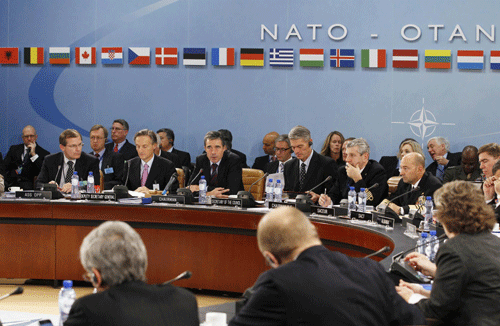Global General
NATO ministers meet to mull new strategy
(Agencies)
Updated: 2010-10-14 17:10
 |
Large Medium Small |
BRUSSELS - Foreign and defense ministers from NATO's 28 nations meet Thursday for a historic first joint session, before a summit conference expected to ratify the 62-year-old alliance's new mission statement and other reforms.
NATO Secretary-General Anders Fogh Rasmussen said the ministers will focus on adapting the Cold War alliance to deal with emerging threats such as ballistic missiles and cyber warfare.
|
 NATO Secretary General Rasmussen attends a NATO defence ministers meeting in Brussels.[Photo/Agencies]
|
Their recommendations will lay the groundwork for a meeting of the alliance's heads of state and government in Lisbon, Portugal, Nov 19 to 20, when Rasmussen will unveil NATO's new strategic concept.
The previous mission statement was adopted in 1999, soon after the Cold War ended and before the Sept 11, 2001 terrorist attacks in the United States led the alliance to take on missions such as counterinsurgency warfare in Afghanistan.
Washington now wants NATO to be equipped to deploy forces to missions outside its traditional theater of operations in Europe, such as Afghanistan or the anti-piracy naval patrols in the Indian Ocean. But many European governments remain wary, and argue that the alliance should not be transformed into a global policeman at a time of austerity and spending cuts.
On Wednesday, US Defense Secretary Robert Gates, who will participate in the meeting with Secretary of State Hillary Clinton, said he was worried about what European defense cuts will mean for the United States. Britain, Germany and other close NATO allies are expected to slash or realign their defense budgets soon.
Gates said the more that US allies cut their capabilities the more the US may be asked to pick up the slack, when the US is also facing budget cuts.
Critics have noted that the new mission statement will have to reconcile other rifts between NATO nations, including a US proposal to eliminate unanimity voting, which has been a cornerstone of the consensus-based alliance.
Another issue is the proposal to expand the secretary-general's powers, allowing him to act in times of crisis. This is opposed by nations skeptical of the top official making decisions independently, especially in light of past American influence.
Some governments also take a dim view of a proposed system of anti-missile defense, citing high costs and maintaining that missile defense systems cannot accomplish the role of a robust nuclear deterrent.
"What is quickly becoming clear is that there are a number of disagreements and ultimately incompatible views among NATO member states," said Marko Papic, an analyst with the global analysis company STRATFOR.
"This will ultimately mean that the new strategic concept presented to heads of government on Oct 20 will be particularly bland and full of inconsistencies," he said in a telephone interview from Austin, Texas.
The war in Afghanistan will not be on the agenda of Thursday's meeting, but will feature prominently at the summit of NATO leaders in Lisbon, Portugal, on Nov 19 to 20.
On Wednesday, General David Petraeus, NATO's top commander in Afghanistan presented a cautiously optimistic assessment on the alliance's progress, including the hand-over of security duties to the Afghan forces, which are due to start next year, officials said.
NATO's first ground war in its 42-year history is entering its 10th year. Over 140,000 international troops, along with about 220,000 government security forces, are still struggling to gain the upper hand against an estimated 30,000 insurgents.